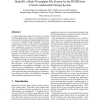Free Online Productivity Tools
i2Speak
i2Symbol
i2OCR
iTex2Img
iWeb2Print
iWeb2Shot
i2Type
iPdf2Split
iPdf2Merge
i2Bopomofo
i2Arabic
i2Style
i2Image
i2PDF
iLatex2Rtf
Sci2ools
129
click to vote
FAST
2010
2010
HydraFS: A High-Throughput File System for the HYDRAstor Content-Addressable Storage System
A content-addressable storage (CAS) system is a valuable tool for building storage solutions, providing efficiency by automatically detecting and eliminating duplicate blocks; it can also be capable of high throughput, at least for streaming access. However, the absence of a standardized API is a barrier to the use of CAS for existing applications. Additionally, applications would have to deal with the unique characteristics of CAS, such as immutability of blocks and high latency of operations. An attractive alternative is to build a file system on top of CAS, since applications can use its interface without modification. Mapping a file system onto a CAS system efficiently, so as to obtain high duplicate elimination and high throughput, requires a very different design than for a traditional disk subsystem. In this paper, we present the design, implementation, and evaluation of HydraFS, a file system built on top of HYDRAstor, a scalable, distributed, content-addressable block storage...
| Added | 02 Oct 2010 |
| Updated | 02 Oct 2010 |
| Type | Conference |
| Year | 2010 |
| Where | FAST |
| Authors | Cristian Ungureanu, Benjamin Atkin, Akshat Aranya, Salil Gokhale, Stephen Rago, Grzegorz Calkowski, Cezary Dubnicki, Aniruddha Bohra |
Comments (0)

